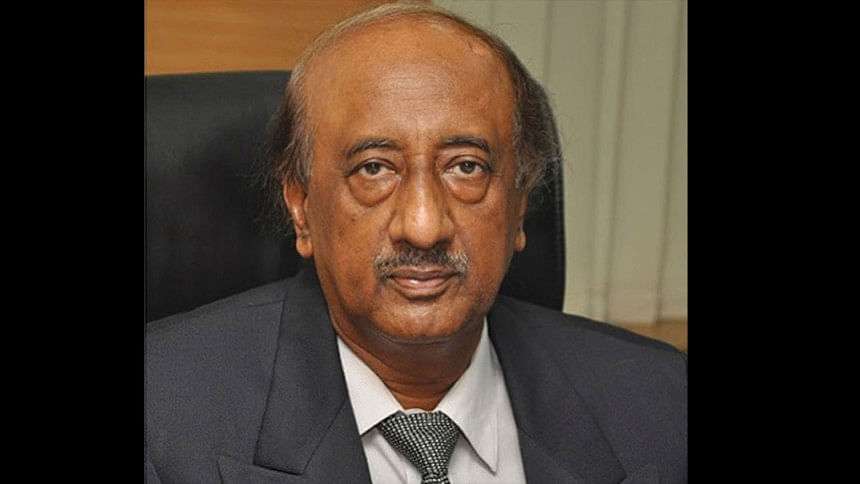Dr Saadat Husain: a fearless, upright civil servant

Dr Saadat Husain, a career civil servant of Bangladesh, passed away on April 22 at United Hospital after suffering from meningitis and renal complications. Born in 1946 in Noakhali, he earned a Master's degree in Economics from the University of Dhaka before joining the Civil Service of Pakistan in 1970.
While working as a probationary officer in the former Narail sub-division, he joined the Liberation War in 1971 and directly contributed to wartime efforts. His book Muktijoddhader Din-Dinanto is an authentic chronicle of the events of 1971 and about the contributions made by freedom fighters in that region.
Dr Saadat assumed the prestigious office of Cabinet Secretary from 2002 to 2005. In this capacity, he took up the task of reorganising and rationalising the division of work and formulating a fresh manual of officers' job descriptions, all of which were in shambles before he took up the task of rectifying this. Later, he was appointed the ninth Chairman of the Bangladesh Public Service Commission (PSC), a constitutional body that he turned into a highly professional recruiting agency of the government; and most importantly, he made it corruption-free.
He was elementally a reformer; wherever he worked, he acted as an agent of change, bringing constructive changes in the public interest. Starting from his position as Registrar at the Department of Co-operatives up to Chairman of the PSC, he succeeded in making positive transformations from within and turning these institutions into dynamic, credible, and people-friendly ones.
After his retirement from the civil service, he was elected President of the Bangladesh Society for Training and Development (BSTD), which was created in 1980. He succeeded Sheikh Maqsood Ali, who was the founder-president of this society, and turned it into a seat of synergic union and collaboration between government organisations and NGOs for training officials and developing professionalism in their respective fields. Dr Saadat was noted for recruiting people for education and training purposes irrespective of caste, creed and political affiliation as President of BSTD, where he worked with zeal and commitment. He elevated this passive entity into a dynamic and popular human resources development centre, and under his enterprising and inspiring leadership, BSTD has been able to set up wide networks at the regional and global levels. He also headed two major public sector training institutes—the BCS (Admin) Academy and BARD, Comilla.
Dr Saadat was a vigilant and decisive supervisor, and at the same time, he was very supportive, friendly and protective of his junior colleagues, and he took his responsibility of instructing them with on-the-job training very seriously. As Cabinet Secretary, he intensively monitored the punctuality of the Deputy Commissioners (DC) of all 64 districts. When I was working as DC in Dhaka, he once phoned me at 8:55 am to check whether I was at office and was very pleased to hear my voice; he believed in following the rules and doing the right thing—it was a way of life for him.
A committed educator and trainer, he believed every public servant must be ready to be a life-long learner and to share that learning with others to assume future leadership positions in the civil service. Wherever he worked, he displayed genuine professionalism as a leader and never practiced nepotism in inducting employees and trainees. As a guardian to junior colleagues, he used to provide unwavering support to those who faced undue harassment from disgruntled politicians. He was a fearless administrator, his courage blended with compassion, and it is a huge pity that some heads of public sector human resources centres showed a planned indifference towards him due to this perceived risk.
"Publish or perish" was his principle. In the civil service, there are many talkers but significantly few writers. Dr Saadat was one of these significant few. He was a prolific writer who produced a number of books and wrote many articles for newspapers, including The Daily Star, and regularly contributed columns in Kaler Kantho, a Bangla daily. His most recent publication (2019) was Nichu Shorey Uchu Kotha, an anthology of 130 articles based on his own experiences. As an expert opinion frequently heard in the media, he earned a reputation as a straightforward and honest civil servant who was a spokesperson of the conscious, enlightened citizenry.
Father of one son and two daughters, he was very affectionate to his family members. A God-fearing person, he never used to miss his prayers five times a day, despite how much he worked. He was definitely a workaholic, and Dr Saadat was not careful about his own health. He did not enjoy respite for a single day after retirement from public service. He died in peace, without ever having been a source of pain to anyone. I'm reminded of the words of Elizabeth Kobler-Ross—"watching a peaceful death of a human being reminds us of a falling star; one of a million lights in a vast sky that flares up for a brief moment only to disappear into the endless night for ever."
He is no more among us, but his values and works will continue to inspire the present and future generations, and through this legacy, he will be remembered forever.
Dr Syed Naquib Muslim, PhD is a freelancer and retired Secretary to the Government of Bangladesh.

 For all latest news, follow The Daily Star's Google News channel.
For all latest news, follow The Daily Star's Google News channel. 



Comments